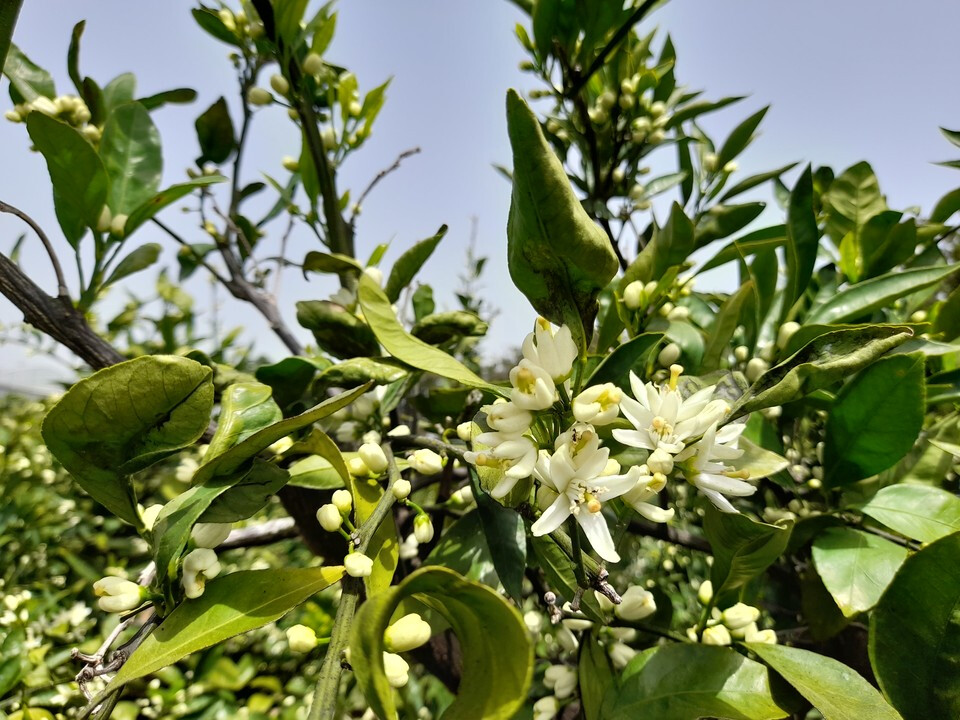
JEJU, South Korea – The anticipated blooming period for open-field mandarin oranges (Citrus unshiu) in Jeju Island is projected to be later than both last year's and the average year's, according to a recent announcement by the Jeju Agricultural Technology Administration on April 16th. This delay, following an earlier postponement in the budding stage, necessitates tailored responses from the island's citrus growers to ensure optimal fruit development and minimize potential losses.
Coastal regions of Jeju are expected to see the mandarin blossoms appear between May 1st and 6th in Jeju City, and from April 27th to May 3rd in Seogwipo City. These dates represent a delay of 1 to 6 days compared to historical averages and the previous year's bloom. The timing of the citrus bloom in April is significantly influenced by prevailing weather conditions, particularly temperature fluctuations. While late March experienced warmer temperatures, April saw a dip, with average temperatures in early to mid-April registering at 13.1°C in Jeju City and 13.6°C in Seogwipo City. These figures are notably lower, ranging from 1.3 to 2.9°C below the average and previous year's temperatures of 14.4 to 16.2°C for the same period.
Impact of Delayed Blooming
While a prolonged period from budding to flowering can potentially benefit the overall growth cycle by allowing for better ovary development and the production of more robust flowers, agricultural experts caution that future weather patterns could alter this positive outlook. Should the interval between budding and blooming shorten due to subsequent temperature increases, it could lead to nutrient deficiencies within the trees. This is particularly concerning for weaker trees or those carrying a heavy fruit load, as it could exacerbate physiological fruit drop – the natural shedding of immature fruit.
Agricultural Response and Recommendations
In light of these predictions, the Jeju Agricultural Technology Administration is actively monitoring the growth progress in relation to the changing weather conditions. They are strongly advising citrus farmers to implement customized fertilization and rigorous pest and disease management strategies.
Specific recommendations include supplementing nutrients for weaker trees or those with excessive fruit through the application of flower and summer fertilizers. Additionally, foliar applications of a 0.2-0.3% solution of urea, calcium nitrate, and magnesium sulfate are recommended from the budding stage up to the commencement of blooming. These measures aim to bolster the trees' nutrient reserves and mitigate the risk of fruit drop.
Furthermore, the administration is emphasizing the critical timing of the initial pest and disease control measures. When new shoots reach a length of 3 to 5 centimeters, typically in mid to late April, farmers are being instructed to apply copper-based agents to combat prevalent issues such as citrus canker and citrus red mite. This early intervention is crucial for preventing widespread infestations and ensuring a healthy crop.
Hyun Gwang-cheol, head of the Technology Support Team at the Jeju Agricultural Technology Administration, underscored the increasing challenges posed by unpredictable weather patterns. "Due to abnormal climate, we are witnessing annual shifts in orchard management practices and the timing of pest and disease control," he stated. "We are committed to providing the necessary guidance and support to minimize the impact on our farmers in this constantly evolving environment."
Budding Period Matches Expectations
Interestingly, the actual budding dates in the coastal areas of Jeju aligned with the earlier forecasts. Jeju City experienced budding from April 4th to 6th, with the actual date being April 4th. Similarly, Seogwipo City's predicted budding period of April 3rd to 5th matched the actual date of April 5th. This accuracy in the budding prediction provides a reliable starting point for managing the subsequent growth stages, even with the anticipated delay in blooming.
Jeju Citrus: Economic and Climatic Context
The citrus industry is a cornerstone of Jeju Island's economy, representing a significant portion of its agricultural revenue. The island's subtropical climate and fertile volcanic soil have historically provided ideal conditions for cultivating high-quality mandarin oranges. However, recent years have seen increasing challenges due to climate change, including rising average temperatures, altered rainfall patterns, and more frequent extreme weather events. These shifts can disrupt traditional cultivation practices, affect fruit quality, and delay harvest times.
Warmer temperatures can interfere with the color development of mandarins, which typically requires nighttime temperatures to fall below 20 degrees Celsius. Prolonged periods of high temperatures can also lead to reduced fruit size and other quality issues. In response to these challenges, agricultural research centers in Jeju are exploring new cultivation techniques and introducing subtropical crops that may be better suited to the changing climate. These include fruits like mangoes, passion fruit, and dragon fruit, offering potential diversification for the island's agricultural sector.
The economic significance of Jeju citrus extends beyond direct agricultural income, impacting related industries such as tourism and processing. The iconic tangerine orchards are also a part of Jeju's cultural heritage, with a long history dating back centuries. Efforts to adapt to the changing climate are crucial for preserving this vital sector of the island's economy and cultural identity.
The anticipated delay in the blooming of Jeju's open-field mandarin oranges serves as a reminder of the increasing impact of climate variability on agricultural practices. The proactive measures and guidance provided by the Jeju Agricultural Technology Administration are essential for supporting farmers in navigating these challenges. By closely monitoring the situation, implementing tailored management strategies, and exploring innovative solutions, Jeju's citrus industry aims to maintain its productivity and quality in the face of a changing environment. The resilience and adaptability of Jeju's farmers, coupled with scientific support, will be key to ensuring the continued success of this important agricultural sector.
[Copyright (c) Global Economic Times. All Rights Reserved.]




























